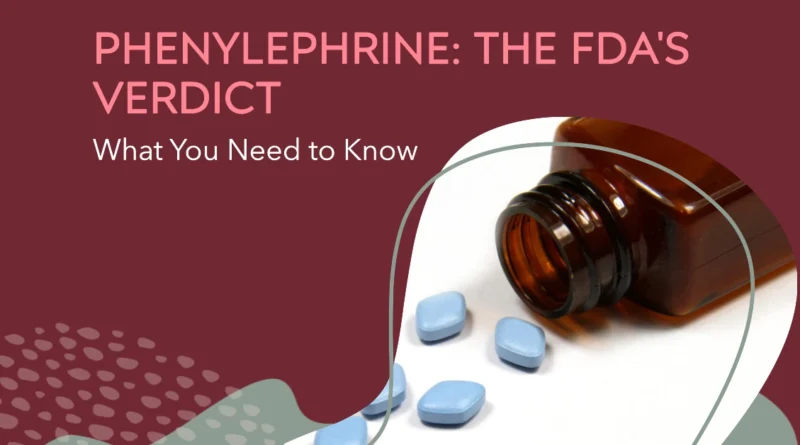The FDA’s Verdict on Phenylephrine: What You Need to Know
In the world of over-the-counter cold and flu medications, many of us have relied on decongestants to alleviate the stuffy nose that often accompanies these common illnesses. One such decongestant, Phenylephrine, has been a key ingredient in numerous products designed to provide relief from nasal congestion. However, recent developments have raised questions about the effectiveness of Phenylephrine as a decongestant, leading the Food and Drug Administration (FDA) to take a closer look at its use in medications.
In this comprehensive article, we will delve into the recent findings by the FDA, explore the implications of these findings, and discuss how they might impact the way we treat common cold and flu symptoms. To provide you with a thorough understanding of this topic, we will include three informative tables with important information related to Phenylephrine and its role in over-the-counter medications.
Some well-known cold and flu medications that include Phenylephrine as an active ingredient
Let’s begin by taking a look at some well-known cold and flu medications that include Phenylephrine as an active ingredient. Please note that this table is not an endorsement of these products but rather a representation of their prevalence in the market.
| Medication | Brand Name | Phenylephrine Content (per dose) | Manufacturer |
| Tylenol Cold + Sinus | Tylenol | 10 mg | Johnson & Johnson |
| Sudafed PE | Sudafed | 10 mg | Johnson & Johnson |
| Mucinex Fast-Max Cold | Mucinex | 10 mg | RB (Reckitt Benckiser) |
| Alka-Seltzer Plus Cold | Alka-Seltzer | 10 mg | Bayer |
| Vicks DayQuil Cold & Flu | Vicks | 10 mg | Procter & Gamble |
These are just a few examples of cold medications that contain Phenylephrine. Many other products on the market also utilize this ingredient to address nasal congestion, often in combination with other active components targeting different symptoms.
FDA’s Assessment of Phenylephrine Effectiveness
The FDA’s recent assessment of Phenylephrine’s effectiveness has sparked discussions and raised questions about its role in over-the-counter medications. Here’s an overview of the FDA’s stance on this decongestant:
| FDA’s Findings | Implications |
| Phenylephrine does not work effectively as a decongestant | The reliability of numerous over-the-counter cold and flu products that contain Phenylephrine is now in question. |
| The effectiveness of decongestants can vary from person to person | While some individuals may still find relief from Phenylephrine-containing products, its overall effectiveness is doubted. |
The FDA’s verdict challenges the status quo and underscores the importance of informed consumer choices when selecting cold and flu medications. It also raises questions about the formulation of these remedies.
Alternatives to Phenylephrine in Cold Medications
In light of the FDA’s findings, consumers may be interested in exploring alternative decongestants that have been deemed effective. Here’s a list of some common decongestant alternatives:
| Active Ingredient | Examples of Medications | Manufacturer |
| Pseudoephedrine | Sudafed, Claritin-D | Johnson & Johnson, Bayer |
| Oxymetazoline | Afrin Nasal Spray | Bayer |
| Phenylpropanolamine | Dimetapp Cold and Allergy | GlaxoSmithKline |
These alternatives have been found to be effective in relieving nasal congestion for many individuals. However, it’s crucial to consult with a healthcare professional or read product labels to ensure these alternatives are suitable for your specific needs and health conditions.
Understanding the FDA’s Evaluation
The FDA’s recent evaluation of Phenylephrine’s effectiveness as a decongestant is based on a review of its performance in various cold medications. It’s important to recognize that this evaluation represents a significant development in the field of over-the-counter medications.
The Phenylephrine Conundrum
Phenylephrine, like many active ingredients in cold medications, has been widely used for years. It’s commonly found in both liquid and pill forms, and consumers have come to rely on it for relief from nasal congestion. However, its efficacy has long been a subject of debate within the medical community.
The main issue with Phenylephrine is its inconsistent performance. Studies have shown that it may not be as effective as other decongestants, and its impact on nasal congestion can vary from person to person. Some individuals may experience significant relief, while others may find it less effective.
This lack of consistent results has led to concerns about Phenylephrine’s reliability as a decongestant. While some people may continue to benefit from its use, others may not experience the relief they seek.
FDA’s Response
In response to the ongoing debate and concerns about Phenylephrine, the FDA decided to take a closer look at its effectiveness. A panel of experts was convened to review existing data and studies related to this decongestant. After careful consideration, the panel reached the conclusion that Phenylephrine does not work effectively as a decongestant.
This decision has significant implications for both consumers and the pharmaceutical industry. It challenges the status quo of many over-the-counter cold and flu medications that prominently feature Phenylephrine in their formulations.
What Does This Mean for Consumers?
For consumers, the FDA’s verdict on Phenylephrine emphasizes the importance of being informed about the medications they use to manage cold and flu symptoms. It highlights the need to read product labels, understand the active ingredients, and be aware of potential variations in effectiveness.
While Phenylephrine-containing products may still provide relief for some individuals, others may not experience the desired results. As such, consumers should be prepared to explore alternative decongestants or combination medications that target multiple symptoms.
The Future of Cold and Flu Remedies
The FDA’s findings may also prompt changes in the formulation of cold and flu medications. Pharmaceutical companies may reconsider the use of Phenylephrine in their products or explore new decongestant options that have demonstrated consistent effectiveness.
The challenge for manufacturers will be to strike a balance between providing effective relief and meeting consumer demand for convenient over-the-counter remedies.
Conclusion
The FDA’s recent evaluation of Phenylephrine has brought to light significant concerns about its effectiveness as a decongestant. While this verdict challenges the status quo in the world of over-the-counter cold and flu medications, it also highlights the importance of informed consumer choices.
As we navigate the complexities of managing common cold and flu symptoms, it’s crucial to stay informed about the active ingredients in the medications we use. Additionally, consulting with healthcare professionals and exploring alternative decongestants may be necessary for those seeking reliable relief from nasal congestion.
The future of cold and flu remedies may see changes in formulation as pharmaceutical companies respond to the FDA’s findings. In the end, the goal is to provide consumers with safe and effective solutions for managing these common illnesses.
As we await potential developments in the pharmaceutical industry, one thing remains clear: being an informed consumer is the first step towards finding the right cold and flu remedy for your needs.




